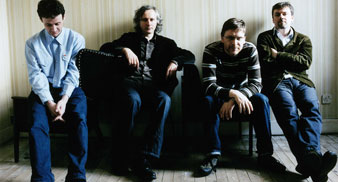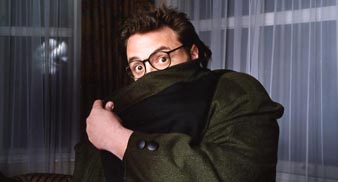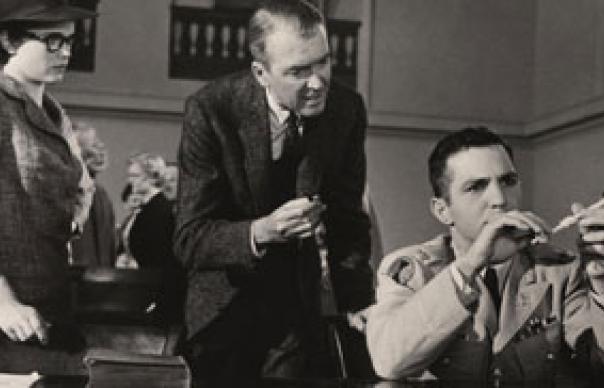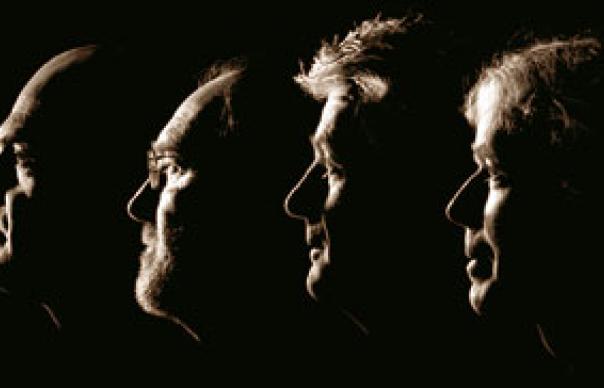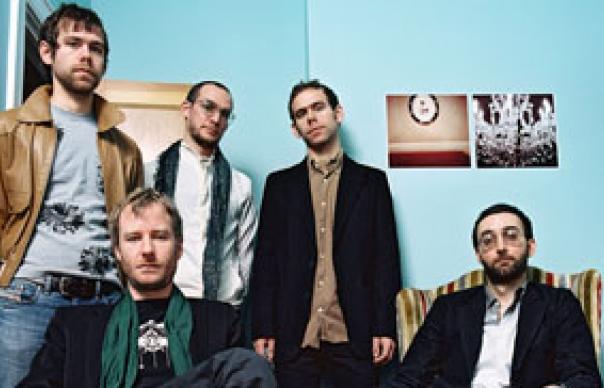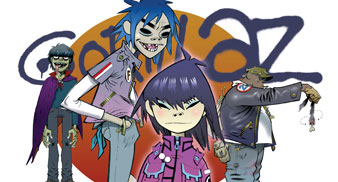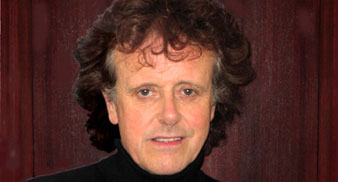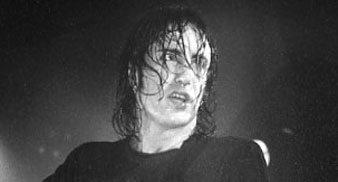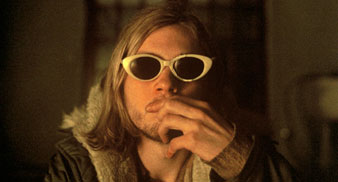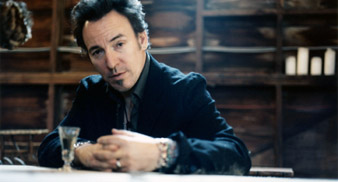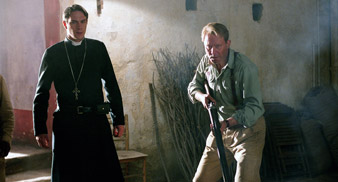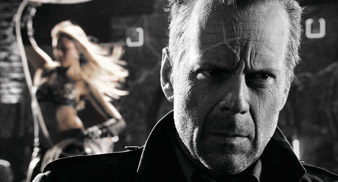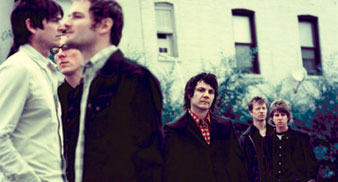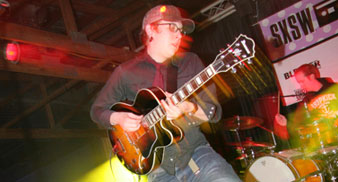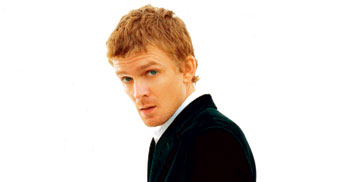It’s March 2005 and Kevin Smith is a tired man. As Uncut is ushered into an understated drawing room at London’s tastefully elegant Langham Hotel, the comic book-loving writer/director/raconteur/slacker icon is garbed in his infamous green and black Silent Bob overcoat and splayed out on a chaise longue, flat out asleep.
Smith tore up the international cinema scene with his breakthrough indie flick, Clerks, a fast-talking, eloquently profane low-budget masterpiece centering on the go-nowhere lives of two convenience store workers. Culled largely from Smith’s own New Jersey convenience store experiences, Clerks won the main prize at Sundance and was rapidly picked up by Harvey & Bob Weinstein’s Miramax. The Weinsteins parlayed Smith’s self-financed $26,800 black & white labour of love into a hugely profitable worldwide hit and swiftly installed Smith at the forefront of their trusted creative inner circle. “I came in right after Quentin’s Reservoir Dogs and before the release of Pulp Fiction. I’m very often – and rightly so – tied to that era, the Golden Age of Miramax, where they fucking exploded.”
Over the ensuing decade, Miramax’s fortunes have risen dramatically, netting them a total of 60 Oscar wins and ten blockbuster movies (from Pulp Fiction to Spy Kids) that have grossed over $100 million at the US box office. Throughout the same period, Smith has written and directed five modestly-budgeted movies under his View Askew imprint: two raucous gung-ho comedies steeped in the comic book-inflected mythos of his “View Askewniverse” (Mallrats and Jay and Silent Bob Strike Back), one controversial religious fantasia (Dogma), one critically-lauded exploration of contemporary sexual politics (Chasing Amy, his best movie to date) and one almost universally-derided experiment in family-friendly comedy drama (2004’s Affleck clunker, Jersey Girl). All but the latter feature Smith and childhood pal Jason Mewes as drug-dealing fanboy icons Jay and Silent Bob.
In a bid to rival Robert Rodriguez as Miramax’s busiest multimedia-hyphenate, Smith has also found time to relaunch two major comic-book heroes (Daredevil for Marvel and Green Arrow for DC), maintain two award-winning websites (ViewAskew.com and MoviePoopShoot.com), film his ongoing series of Roadside Attractions shorts for Jay Leno’s Tonight Show, produce an infamously short-lived Clerks cartoon show for the ABC network and launch an outrageously successful career as a raconteur on the US college lecture circuit (spawning the never-less-than-100%-entertaining DVD ‘An Evening with Kevin Smith’).
The View Askew canon’s record-breaking performance on DVD has ensured that Smith, along with Quentin Tarantino and Robert Rodriguez, is one of the company assets that the Weinstein brothers are taking with them following their acrimonious split from Disney. Harvey and Bob have had to sacrifice their beloved Miramax company name (named after their parents, Miriam and Max) but managed to keep their Dimension Films imprint. Dimension plans to release 15 to 20 films per year and the first of these is Smith’s soon-to-be-filmed Clerks sequel, The Passion of the Clerks, a production that promises to play to his creative strengths after the misfire of Jersey Girl.
As Uncut thuds down in a chair opposite, Smith gingerly opens one eye. He’s clearly fucked after a marathon five-hour Q&A session (recorded at London’s Criterion Theatre for his soon-to-be-released An Evening with Kevin Smith 2: Evening Harder DVD), swiftly followed by a long day promoting his new book, Silent Bob Speaks (a must-read collection of Smith’s sardonic magazine columns – reviewed by Uncut this month, June 2005).
Nonetheless, Smith is a man who’s incapable of delivering a half-arsed anecdote and, mere seconds after his wearily amiable greeting, he’s sat bolt upright, issuing forth with evangelical New Jersey zeal on ten years of Miramax, his real opinion of Tarantino, the brilliance of Shaun of the Dead and the raw animal power of iconoclastic Miramax boss Harvey Weinstein.
You’re the man who extended Miramax’s independent portfolio beyond the pure art-house aesthetic. Who, besides Harvey and Bob Weinstein, deserves the credit for Miramax’s initial rise to power?
You gotta give it up to Steven Soderbergh for Sex, Lies and Videotape in ’89, man.
Sex, Lies was Harvey and Bob’s first multi-million dollar grosser – they did $25 million with that. It was an independent film that travelled well beyond the art house ghetto. After that, Tarantino is the one that blows Miramax off the fucking map. Miramax became The House That Quentin Built because Pulp Fiction made over 100 million bucks at the US box office alone – unheard of at that time for an independent flick.
Now that they’ve stormed out of Disney, is it easy to assess the scope of the Weinstein brothers’ contribution to moviemaking over the last fifteen years?
Without Harvey and Bob, independent film doesn’t get into the hands of the masses. Essentially, without them, it stays within the art house community. Harvey and Bob are responsible for taking indie flicks and bringing them to the suburbs. I grew up in the fucking backwoods of New Jersey and if I wanted to see movies like Prick Up Your Ears or My Own Private Idaho, I had to travel all the fucking way into New York to see them. Harvey and Bob completely changed the game, they took those movies to the fucking suburbs.
They gave the audience the benefit of the doubt, something that the major studios hadn’t done since the late 70’s, when they decided that all American audiences wanted to see were these big budget fucking popcorn movies. They fucking forgot that there was a whole period of fantastic, successful movies that weren’t instantly commercial or marketable, made by the young turks of the 70’s.
Harvey and Bob essentially reinvented that period and put independent movies back into the hands of the regular neighbourhood people who weren’t metropolitan sophisticates.
You reference Quentin Tarantino’s importance to Miramax. As a fellow Weinstein employee, what’s your take on QT?
Tarantino? Brilliant. Without him, I don’t have a fucking job. I saw Reservoir Dogs and I was like “Oh my god, you can reference The Thing [from Marvel Comics’ Fantastic Four] in a movie? Ben Grimm? You can have a poster of The Silver Surfer hanging up? You can dissect a fucking song by Madonna?” So that opened up the door for me with Clerks.
Y’know, you sit there with Pulp Fiction going “Why can’t there be more movies like this?” and at the same time you’re so glad that there’s not more flicks like Pulp Fiction because you wouldn’t appreciate Quentin as much as you do. That movie was a total eye-opener, it’s like a masterclass in mixing tones. When I first saw it, I was like “Okay, you can make a movie where one moment it’s very funny and the next minute somebody’s getting their fucking head blown off.” He really is the progenitor, man – he’s the godfather of everything.
Is Tarantino a Jay and Silent Bob fan?
I saw Quentin on a US TV show when Chasing Amy came out. It was around the time that Jackie Brown was released and he was sitting in with a bunch of critics discussing movies of the year. Anyway [Time Magazine film critic] Richard Corliss asked Quentin what his favourite movie of the year was and he said: “Chasing Amy, because Kevin Smith took a quantum leap between that movie and his first two movies.” I mean, that meant everything to me – my fucking head almost exploded because I respect the guy so much.
A couple of years later, I saw him at the Jay and Silent Bob Strike Back premiere and he fucking loved the movie. I was like “You? You loved that movie?” But he really did. His only complaint was that he wasn’t in it. He said: “You made a fucking movie about Miramax and you didn’t put me in it?”
Jay and Silent Bob Strike Back [Smith’s lunatic, self-reverential 2001 cartoon romp through the mythology of his previous four movies, full of returning characters, bad taste gags and celebrity cameos] was a real weird movie for me, ‘cause that was the one that – for some reason – seemed to gain me the credibility and respect of the dudes who’ve been doing this longer than I have. Robert Rodriguez fucking loved that movie. Richard Linklater was like “I really think that’s your best work, you’re on solid footing with this movie” and I’m like “That movie is my best work?”
Six movies into your film-making career, do you get debut fimmakers quoting Kevin Smith as an influence?
A while ago, Quentin called me up and said “I’m having a screening of this British movie Shaun of the Dead, have you seen it yet?” So I went over to Quentin’s and I fucking loved the movie. Last night, I was out in London with the dudes who made it, Edgar Wright and Simon Pegg – excellent fucking guys. They were telling me about seeing Clerks for the first time and that watching Dante and Randall have the Star Wars conversation was a real eye opener for them. They were like “My god, you can really talk about stuff like this on film?” and when they put things together a few years later, that scene informed what they were doing with their TV show, Spaced.
Two of Hollywood’s highest profile leading men, Matt Damon and Ben Affleck, and an Uncut favourite, Jason Lee, all received their first break working for you, right?
I met Affleck and Lee through the Mallrats auditions – we set open auditions and they were the two dudes who came through. When we were shooting the flick, I just fell in love with them both. I met Matty Damon through Affleck and just kept using all three of them from then on. Affleck is like one of the funniest people you’ll ever meet – a tall, good looking, smart guy who’s really fucking witty. He’s really got everything. There isn’t much difference between Ben and Matt then and Ben and Matt now, except now they work more steadily and have a lot more fucking cash.
Of course, Affleck, right now, is getting the shit knocked out of him – but that seems to have run its course.
What makes you think that open season on Affleck is over?
I think that Truth, Justice and the American Way (Allen Coulter’s upcoming movie about the mystery surrounding typecast 50’s Superman actor George Reeves’ sudden death, starring Affleck as Reeves] is the movie that’ll put him back on top. It’s Ben Affleck, a guy whose career has been troubled over the last year, playing George Reeves, a guy who’s career had been troubled for many years prior to his death. It’s a perfect role for him, and he’s not the lead – the movie’s really about the guy investigating Reeves’ death [played by Adrien Brody], so Affleck doesn’t have to carry the whole fucking thing. It’s a perfect comeback vehicle and we know this because we have Pulp Fiction as the model – this is the Travolta role from Pulp Fiction.
Were you around when Miramax picked up the movie that kicked Affleck & Damon into the big leagues – Good Will Hunting?
Back when I was writing Chasing Amy for Affleck, he gave me the Good Will Hunting script and asked me to put it in front of Harvey. I read it in the bathroom. I was there for two hours and just read the whole fucking script – y’know, fucking weeping on the toilet, which I normally do when I look between my legs. I fucking loved the script and I called Harvey and said “Boss, I know this sounds stupid, but this script my friends wrote, it’s like the best thing I’ve ever read, it’s fucking breathtaking. Like it’s good, it’s Oscar good…. I think. But it comes with a huge turnaround cost. It’s currently with Castle Rock, who picked it up for $800 grand – it’ll probably cost you a million bucks”. Harvey tells me that he never pays that kind of money for a script, that’s really fucking high, but what the fuck, send it over anyway and he’ll read it over the weekend. First thing Monday, Harvey calls me back and starts booming: “I’m buying this, I fucking love it.” So that put us all in the Miramax family – Matt, Ben and me. I was already kind of there with Chasing Amy, but that lodged us firmly in there with Harvey and Bob.
You’ve often described Harvey Weinstein as a father figure and famously defended him when Peter Biskind trashed him in his 2004 book, Down and Dirty Pictures. On the eve of your fifth collaboration with The Passion of the Clerks, what’s your final word on the notorious Harvey Weinstein?
He’s a fantastic man, a great beast. From time to time, he asks me “Why do you call me a beast?” It’s got nothing to do with his size, it’s just that he’s this great beast that doesn’t exist anymore, who’s all commerce and passion at the same time. With the US studio system, you get people who are all about the commerce and very little about the passion. Harvey just can’t be one without the other. He’s always a businessman, always thinking about how he can turn a buck off stuff, but how he directs movies into the cinemas and how he figures out what he wants to change about them and how he gets behind certain movies – that’s all about genuine fucking passion. He’s like an old-time Hollywood studio boss.
It’s easy to take shots at contemporary Hollywood and say: “They don’t care about the art.” It’s easy ‘cause it’s fucking true – they really flat out don’t care about the art and they fucking didn’t until Harvey and Bob showed up.
So, he’s just your average misunderstood movie mogul?
He’s just this unique dude who’s a real creature of the ego and the id. He has this powerful fucking demeanour that’s a combination of regal and street. Like, when he bought Clerks, Harvey called us over to this restaurant at Sundance and he was sitting there, eating the greasiest fucking pile of potato skins and smoking a cigarette at the same time, going from one to the other bellowing “I fucking love this movie, I’m taking this fucking movie and we’ll put it in fucking multiplexes. We’re gonna put a fucking soundtrack on it and we’re gonna fucking blow it out”. We were like: “Fucking A, he talks like us.”
He really is a splendid, splendid man. Kind of like Henry the Eighth, or Ray Winstone in Sexy Beast, but coupled with that edge that Ben Kingsley has in Sexy Beast. He can be very fucking dangerous at times. Thankfully, it’s never been turned on me but I’ve seen it turned on and, shit, he’s a fucking frightening dude when he wants to be.
Interview by Andrew Sumner


